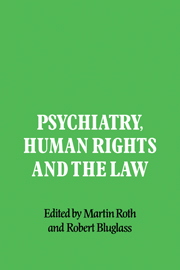Book contents
- Frontmatter
- Contents
- Editors' preface
- Contributors
- The historical background: the past 25 years since the Mental Health Act of 1959
- The social and medical consequences of recent legal reforms of mental health law in the USA: the criminalization of mental disorder
- The recent Mental Health Act in the United Kingdom: issues and perspectives
- Medical and social consequences of the Italian Psychiatric Care Act of 1978
- Lessons for the future drawn from United States legislation and experience
- Recent developments in relation to mental health and the law in the Federal Republic of Germany
- Psychopathy and dangerousness
- Dangerousness in social perspective
- Psychiatric explanations as excuses
- Detention of patients: administrative problems facing Mental Health Review Tribunals
- Developments in forensic psychiatry services in the National Health Service
- The role of psychiatry in prisons and ‘the right to punishment’
- Human rights in mental health
- Changes in mental health legislation as indicators of changing values and policies
- The Danish experience: one model of psychiatric testimony to courts of law
- A postscript on the discussions at the Cambridge Conference on Society, Psychiatry and the Law
The recent Mental Health Act in the United Kingdom: issues and perspectives
Published online by Cambridge University Press: 04 August 2010
- Frontmatter
- Contents
- Editors' preface
- Contributors
- The historical background: the past 25 years since the Mental Health Act of 1959
- The social and medical consequences of recent legal reforms of mental health law in the USA: the criminalization of mental disorder
- The recent Mental Health Act in the United Kingdom: issues and perspectives
- Medical and social consequences of the Italian Psychiatric Care Act of 1978
- Lessons for the future drawn from United States legislation and experience
- Recent developments in relation to mental health and the law in the Federal Republic of Germany
- Psychopathy and dangerousness
- Dangerousness in social perspective
- Psychiatric explanations as excuses
- Detention of patients: administrative problems facing Mental Health Review Tribunals
- Developments in forensic psychiatry services in the National Health Service
- The role of psychiatry in prisons and ‘the right to punishment’
- Human rights in mental health
- Changes in mental health legislation as indicators of changing values and policies
- The Danish experience: one model of psychiatric testimony to courts of law
- A postscript on the discussions at the Cambridge Conference on Society, Psychiatry and the Law
Summary
The new Mental Health Act for England and Wales which came into force on 30 September 1983 is a landmark in the history of the care of the mentally ill and mentally handicapped. It is of importance for a number of reasons. It is not simply a cosmetic improvement to the generally successful Mental Health Act of 1959, but represents the conclusion of a lengthy period of intense debate reflecting the growing interest and concern for human rights and the continuing commitment of mental health workers to ensure that patients receive the treatment and relief from suffering that they need. The 1959 Act was itself a considerable innovation with its adoption of informal admission procedures, the movement away from judicially approved commitment and the establishment of independent Mental Health Review Tribunals to reconsider compulsorily detained psychiatric patients. Curran (1978), in his comparative analysis of mental health legislation across the world, has demonstrated the extensive imitation of these innovations by many other countries.
The 1959 Act followed a comprehensive review of the law relating to mental illness and ‘mental deficiency’ by a Royal Commission established during a period of therapeutic optimism and social legislative reform, when the mental health laws of England and Wales were still based upon the accumulated statutes of the nineteenth century and early decades of the twentieth. However, it preceded by several years the international human rights movement that resulted in concentrated activity in North America and in the declarations of human and political rights of the United Nations and other international bodies such as the European Convention on Human Rights.
- Type
- Chapter
- Information
- Psychiatry, Human Rights and the Law , pp. 21 - 31Publisher: Cambridge University PressPrint publication year: 1985
- 4
- Cited by



